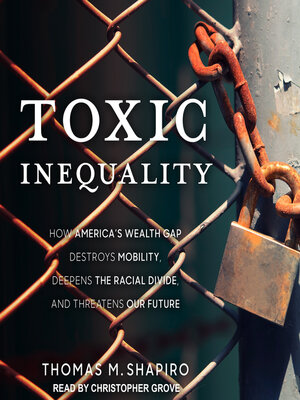Toxic Inequality
audiobook (Unabridged) ∣ How America's Wealth Gap Destroys Mobility, Deepens the Racial Divide, and Threatens Our Future
By Thomas M. Shapiro

Sign up to save your library
With an OverDrive account, you can save your favorite libraries for at-a-glance information about availability. Find out more about OverDrive accounts.
Find this title in Libby, the library reading app by OverDrive.



Search for a digital library with this title
Title found at these libraries:
| Library Name | Distance |
|---|---|
| Loading... |
Since the Great Recession, most Americans' standard of living has stagnated or declined. Economic inequality is at historic highs. But inequality's impact differs by race; African Americans' net wealth is just a tenth that of white Americans, and over recent decades, white families have accumulated wealth at three times the rate of black families. In our increasingly diverse nation, sociologist Thomas M. Shapiro argues, wealth disparities must be understood in tandem with racial inequities—a dangerous combination he terms "toxic inequality."
In Toxic Inequality, Shapiro reveals how these forces combine to trap families in place. Following nearly two hundred families of different races and income levels over a period of twelve years, Shapiro's research vividly documents the recession's toll on parents and children, the ways families use assets to manage crises and create opportunities, and the real reasons some families build wealth while others struggle in poverty. The structure of our neighborhoods, workplaces, and tax code—much more than individual choices—push some forward and hold others back.
America's growing wealth gap and its yawning racial divide have been forged by history and preserved by policy, and only bold, race-conscious reforms can move us toward a more just society.
In Toxic Inequality, Shapiro reveals how these forces combine to trap families in place. Following nearly two hundred families of different races and income levels over a period of twelve years, Shapiro's research vividly documents the recession's toll on parents and children, the ways families use assets to manage crises and create opportunities, and the real reasons some families build wealth while others struggle in poverty. The structure of our neighborhoods, workplaces, and tax code—much more than individual choices—push some forward and hold others back.
America's growing wealth gap and its yawning racial divide have been forged by history and preserved by policy, and only bold, race-conscious reforms can move us toward a more just society.







